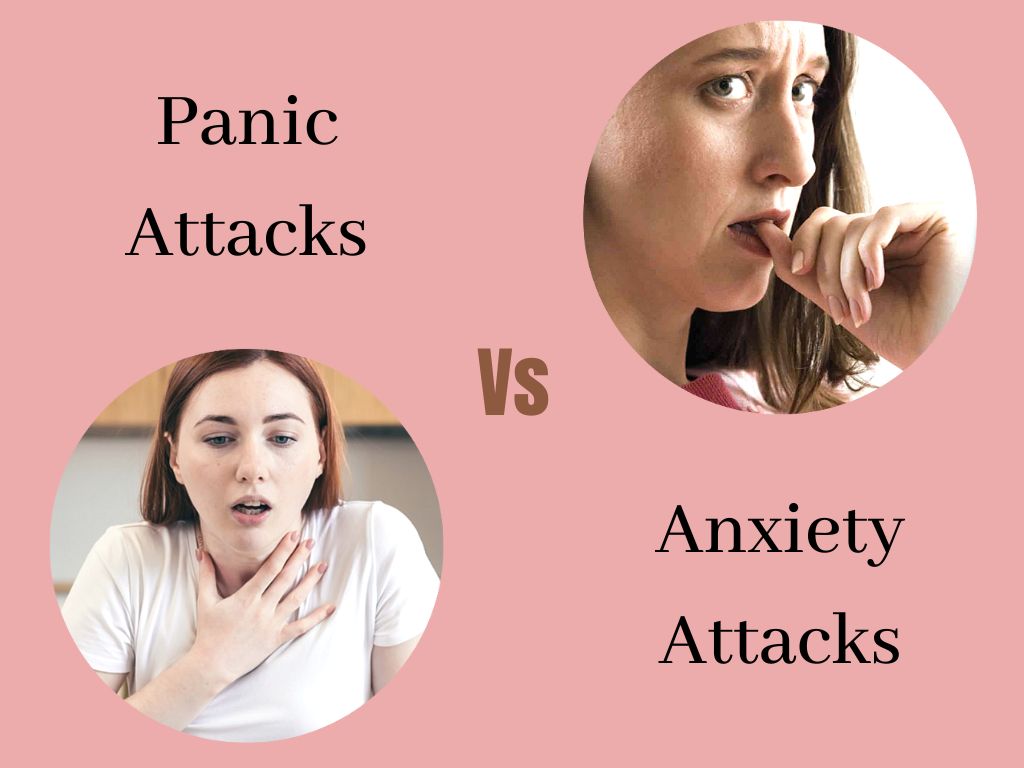
An anxiety attack and a panic attack have several characteristics. But anxiety can develop over time and is frequently brought on by certain situations. On the other hand, panic episodes can come on suddenly and without warning. Know here.. Anxiety attack vs panic attack | What’s the Difference Between ?
The terms “panic attack” and “anxiety attack” are sometimes used interchangeably. But these are different circumstances.
Keep reading to learn more about the difference between anxiety and panic attacks.
What Exactly is a Anxiety Attack?
Anxiety attacks are not listed in the “Diagnostic and Statistical Manual of Mental Diseases, Fifth Edition” (DSM-5), but anxiety is listed as a symptom of several prevalent psychiatric disorders.
This covers the following circumstances:
- Separation anxiety disorder,
- Agoraphobia without a history of panic disorder,
- Post-traumatic stress disorder,
- Social anxiety disorder,
- Obsessive-compulsive disorder
- Particular phobia are a few anxiety disorders that can affect people.
Anxiety is frequently linked to the impending presence of a stressful circumstance, encounter, or event. So, It could develop gradually.
Anxiety symptoms include:
- Worry
- Distress
- Fear
It is impossible to identify the signs and symptoms of anxiety attacks. Thus there is room for interpretation.
Read More -: How to Find Joy in Life | 7 Habits to Add to Your Routine
Panic Attacks: What Are They?
Intense, frequently paralyzing terror occurs during panic episodes, which start suddenly. Physical symptoms such as a racing heartbeat, shortness of breath, or nausea are also present and are tough to deal with.
The DSM-5 classifies panic attacks as predictable or unexpected and distinguishes between them.
Without an apparent reason, unplanned panic episodes happen. Phobias are one type of external stressor that can trigger anticipated panic episodes.
Although panic attacks can occur to anyone at any time, having more than one may indicate panic disorder, a mental health disease defined by unexpected and frequent panic attacks.
Symptoms of Anxiety vs panic attack
There are many mental and physical symptoms that anxiety attacks and panic attacks have in common. An anxiety attack and a panic attack are both possible at once.
For instance, you might feel anxious if you’re worried about a circumstance that could be stressful, like a crucial presentation at work. Anxiety may result in a panic attack when the situation arises.
Both a panic attack and an anxiety attack can result in both physical and psychological symptoms, such as:
- Apprehension and worry, distress,
- Fear of dying or losing control,
- A sense of separation from the world (derealization) or oneself (depersonalization),
- Heart palpitations or an accelerated heart rate,
- Chest pain,
- Shortness of breath,
- A tightening in the throat or feeling like you’re choking,
- Dry mouth,
- Sweating,
- Chills or hot flashes,
- Trembling or shaking,
- Numbness or tingling (paresthesia),
- Nausea,
- Abdominal pain,
Differentiating between anxiety and a panic attack can be challenging. Keep the following in mind:
- The cause: anxiety is usually regarded as stressful or dangerous. Stressors don’t usually trigger manic episodes. But, the majority of the time, they come out of nowhere.
- The degree of anxiety: Anxiety can range from minor to severe. As you go about your daily tasks, fear can happen in the back of your mind. Panic episodes, on the other hand, usually feature severe, disruptive symptoms.
- Fight-or-flight: The body’s automatic fight-or-flight response takes command during a manic episode. The symptoms of anxiety are often less severe than the physical ones.
- Speed of onset: Unlike panic episodes, which can start suddenly, anxiety can sometimes increase gradually.
- Effect: Fears or anxiety about having another attack are frequently brought on by panic attacks. Your behavior may change. As a result, you avoid places or situations where you think a panic attack might occur.
Anxiety Attack vs Panic Attack : Their causes
An unexpected panic attack has no clear external cause. The same things that might cause panic attacks can also cause anxiety. Typical causes include:
- A demanding job,
- Driving,
- Social situations,
- Phobias such as agoraphobia (fear of crowded or open spaces), claustrophobia (fear of small spaces), and acrophobia (fear of heights), reminders or memories of traumatic events,
- Chronic conditions such asthma, irritable bowel syndrome, diabetes, heart disease,
- Chronic pain,
- Withdrawal from drugs or alcohol,
- Caffeine,
- Medications and supplements,
- Thyroid issues,
Frequently Asked Question
Although the exact etiology of panic attacks is unknown, certain factors, such as genetics, mental health issues, extreme stress, or susceptibility to stress, may significantly impact them. Most of the time, panic attacks are brought on by misinterpreting bodily anxiety signals.
What takes place during a test for panic disorder? In addition to conducting a physical examination, your primary care physician may question you about your feelings, mood, behavior patterns, and other symptoms. To rule out a heart attack or other physical conditions, your doctor may order blood tests and cardiac examinations.
Many people only experience one or two panic attacks throughout their lives, and the issue usually goes away when a stressful circumstance is over. However, if you’ve experienced frequent, unanticipated panic attacks and have endured protracted periods of constant fear of an attack, you may have a panic disorder.
Yes, without a doubt—but only if they receive treatment. With a range of therapy available, panic disorder is very curable.




[…] Also Read – Anxiety vs Panic Attack | What are the Differences? […]